What Did One Volcano Say to the Other
13 Volcanoes That Could Erupt Next—or Already Are
Volcanoes rarely erupt without some kind of warning—swelling from magma, earthquakes, ash clouds. Geologists are closely watching these active ones, some of which are already erupting.
 Robert Crow/Shutterstock
Robert Crow/Shutterstock
Bagana
Bagana is one of seven active volcanoes on Papua New Guinea's Bougainville Island. It has erupted 22 times since 1842—usually explosively, and sometimes with emissions of lava. This designated cinder cone volcano has been erupting almost constantly since 1972, and as of early December of 2018, it was releasing ash and gas. Check out 13 volcanoes you can actually visit.
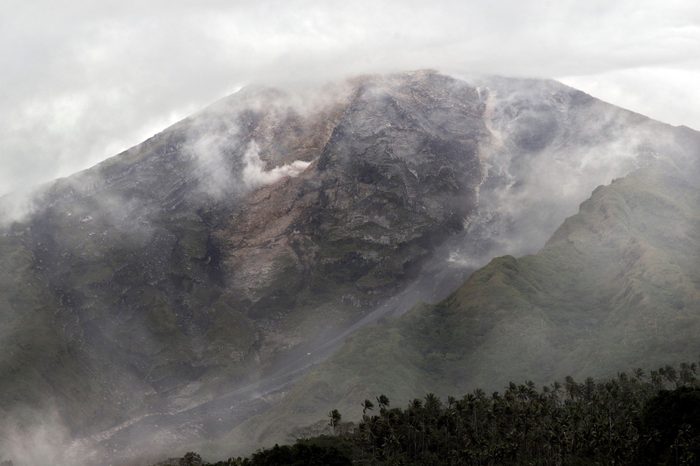 Uncredited/AP/Shutterstock
Uncredited/AP/Shutterstock
Karangetang
In late December 2018, volcano scientists raised the alert level for Karangetang (aka Api Siau) in Indonesia, which is situated along the Pacific Ocean's so-called Ring of Fire. A sustained uptick in earthquake activity represented enough "increased activity" from November's reports of volcanic ash plumes; as of this writing, the volcano has Level 3 (out of 4) alert status.
 Dan Lee/Shutterstock
Dan Lee/Shutterstock
Kilauea
Hawaii's extremely active shield volcano—a type composed almost entirely of active lava flows—is temporarily on hiatus. That's following its high lava flow activity for three months during the summer of 2018 that led to a collapse of its summit crater, says Science News. It's resting at Level 2 now, but residents of Hawaii know from past experience that low activity (in this case, smoking a bit and showing signs of ground swelling from underground magma) doesn't mean it will stay quiet. Here are 20 great reasons to visit Maui.
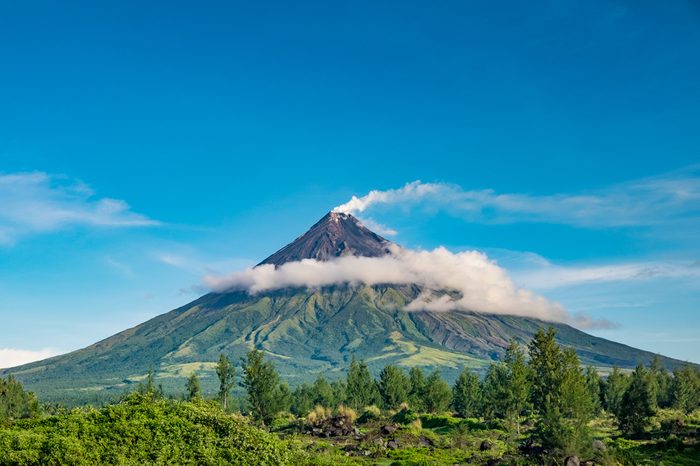 Puripat Lertpunyaroj/Shutterstock
Puripat Lertpunyaroj/Shutterstock
Mayon
Mayon in the Philippines erupted twice on the morning of December 27, 2018, spewing ash and steam plumes even as, according to Rappler, it continued to bulge with magma around its midsection. Although still only at ("moderate") alert Level 2 as of this writing, scientists warned that it could suddenly explode. This volcano has a "permanent danger zone" of 3.7 miles, as well as an "extended danger zone" of 4.3 miles; play it safe by staying at least five miles away from this lively volcano.
 Nathan Mortimer/Shutterstock
Nathan Mortimer/Shutterstock
Great Sitkin
In Alaska's Aleutian Islands, Great Sitkin has been in "a state of volcanic unrest since September 3, 2018," according to the U.S. Geological Survey. Although daily updates for January have logged little to no activity, it's on watch due to small earthquakes that grumbled beneath it last August, which ultimately led to a small phreatic eruption—that is, an explosion of water and steam heated up by underground magma.
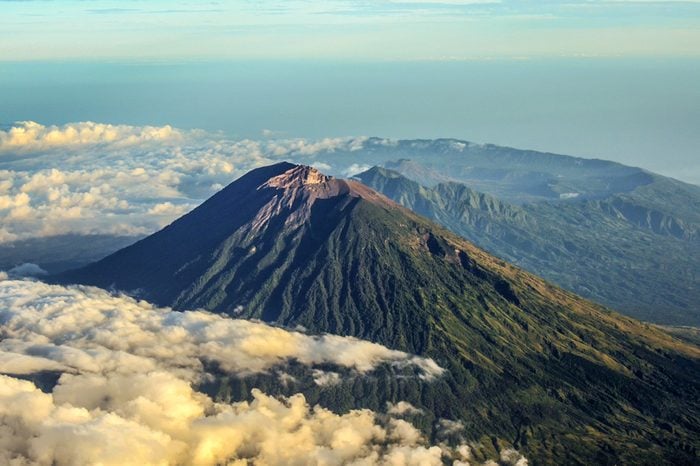 Putu Artana/Shutterstock
Putu Artana/Shutterstock
Mount Agung
Agung is a highly explosive volcano in Bali, Indonesia, that's been erupting off and on for the last couple of years. It last experienced a short eruption on the evening of January 21—totaling one minute and 12 seconds, reported the Jakarta Post; it sent ash spewing and caused authorities to issue a Level 3 alert. Mount Agung erupted again on January 22, releasing an ash cloud 1.2 miles into the atmosphere. It could very likely erupt again—more significantly—sometime soon. Check out natural wonders around the world you've never heard of.
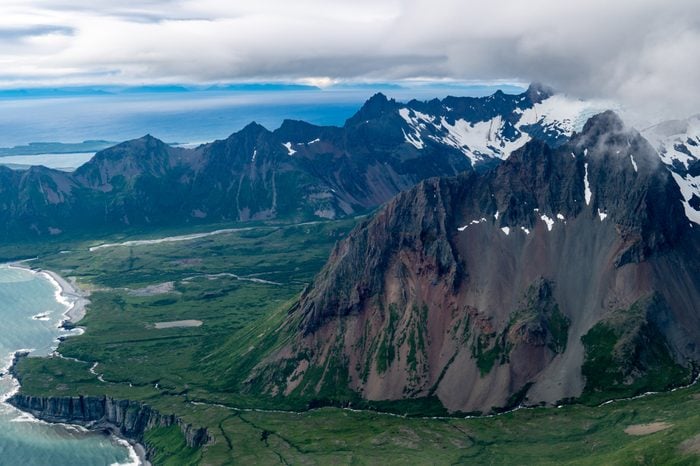 melissamn/Shutterstock
melissamn/Shutterstock
Mount Cleveland
A map of the Alaska Peninsula and the Aleutian Islands shows a whole string of active volcanoes; of these, Mount Cleveland is currently the only one that's at Level 3, active-watch status. According to the mountain's Observatory page, it has "strongly elevated surface temperatures" at the summit, a gathering lava dome inside its crater, and has common "periodic explosions [that] occur without warning,"
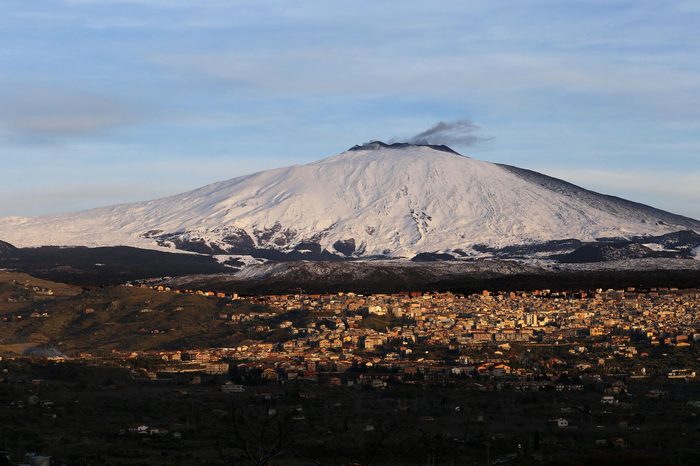 Genia/IPA/Shutterstock
Genia/IPA/Shutterstock
Mount Etna
This 10,900-foot tall stratovolcano (it's made of layers of lava and ash) on the island of Sicily is one of the most active in the world—it erupted every year from 2014 to 2017. As of late January of this year, it was showing signs that it was active. Small earthquakes were shaking its western, southern, and eastern flanks, according to volcanodiscovery.com. And its northeasterly crater is emitting ash plumes.
 Wead/Shutterstock
Wead/Shutterstock
Mount Veniaminof
Like its Alaskan neighbor Great Sitkin, Veniaminof has been actively grumbling for months, sending out ash emissions that aren't yet considered significant enough to warrant more than a Level 2 alert. However, it did manage to earn an Aviation Color Code of Orange (the second highest warning) in December 2018, after lava and ash plumes caused some potential hazards to airplane safety.
 Fernando Vergara/AP/Shutterstock
Fernando Vergara/AP/Shutterstock
Nevada del Ruiz
This 17,320-foot stratovolcano in Columbia hadn't erupted for 20 years when it began letting out intermittent ash emissions in 2012, according to the Smithsonian Institution's Global Volcanism Program. This activity continued through 2015. Then, it picked up again in October of 2018, with seismic rumblings, and water, vapor, ash, and gas plumes.
 imageBROKER/Shutterstock
imageBROKER/Shutterstock
Ol Doinyo Lengai
Known as the "Mountain of God to Tanzania's Masai, Ol Doinyo Lengai developed a crater at its summit after it last erupted in 2007. This eruption occurred after months of what an Al Jazeera report identified as seismic rumblings. It has since been slowly releasing its rare carbonatite lava into that crater and rumbling again, placing it firmly on active status. Don't miss these colorful natural wonders around the world.
 Raka Mariko/EPA/Shutterstock
Raka Mariko/EPA/Shutterstock
Sangeang Api
Yet another Indonesian Ring of Fire volcano—this mountain sports two active cones. In 2017, Sangeang Api experienced a mildly explosive so-called "strombolian" eruption (it tossed lava bombs a few hundred of meters into the air). The mountain has been pretty much rumbling and ash-ing off and on ever since. In October of 2018, it released a series of ash emissions—some of them stretching 7,000 feet high. Its current alert status is Level 2.
 Francisco Negroni/EPA/Shutterstock
Francisco Negroni/EPA/Shutterstock
Villarrica
After a five-week break in which this strombolian-style volcano in Chile didn't explode once, it was back at it again on January 4, spewing 100-foot lava fountains from the top and sending ash down its flanks. Although it's currently only at Level 2 alert status, the mountain is continuing to gather lava in the lake inside its crater; it's also "restlessly" belching out ash. Now, make sure to add these one-of-a-kind adventures to your bucket list.
Originally Published: February 21, 2019
Sign up for articles sent right to your inbox
Enjoy the best stories, advice & jokes delivered right to your inbox!

Subscribe & SAVE Save Up To 84%!
What Did One Volcano Say to the Other
Source: https://www.rd.com/list/volcanoes-erupt-next/
0 Response to "What Did One Volcano Say to the Other"
Post a Comment